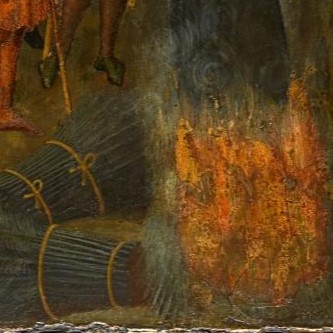

Adam Duff O’Toole (Adam Dubh Ó Tuathail) was a reputed heretic, who was burned at the stake for his denials of key Christian doctrines (including the Trinity, the virgin birth, resurrection, and the truth of the scriptures).
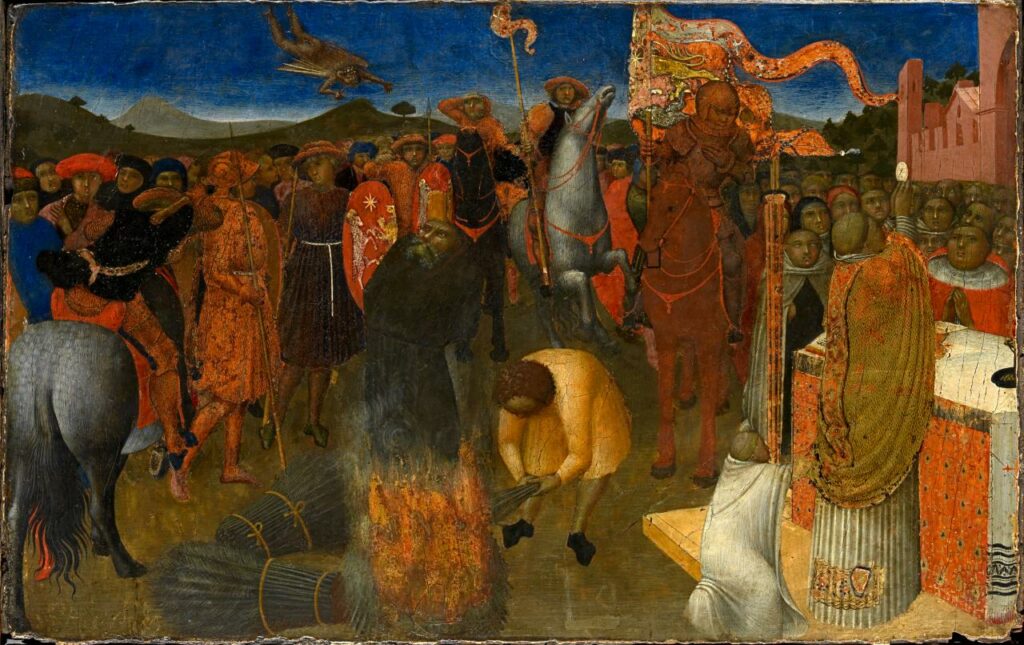
In his Chronicles of England, Scotland, and Ireland (1577), Ralph Holinshed described:
A gentleman of the familie of the O’Toolies in Leinster, named Adam Duffe, possessed by some wicked spirit of error, denied obstinatelie the incarnation of our Savior, the trinitie of persons in the unitie of the Godhead, and the resurrection of the flesh; as for the holie Scripture, he said it was but a fable: the Virgin Marie he affirmed to be a woman of dissolute life, and the apostolike see erroneous. For such assertions he was burnt in Hogging greene, beside Dublin.
Ralph Holinshed, Chronicles of England, Scotland, and Ireland (1577)
Although the facts about his life are scarce, O’Toole’s fate as a ‘heretic’ and freethinker place him firmly in the tradition of religious scepticism and challenge to Church authority taken up by hundreds more freethinkers and humanists in the centuries since his death. In some cases, the word ‘heretic‘ was taken up by humanists to express a duty to think freely, question openly, and act according to personal conscience.
The biography reprinted below was first published in October 2009 as part of the Dictionary of Irish Biography. It is reproduced here under the terms of the Creative Commons Attribution Non Commercial 4.0 International license.
Contributed by O’Byrne, Emmett
O’Toole (Ó Tuathail), Adam (d. 1327), heretic, was son of Walter Dubh O’Toole of Kildare, a prominent anglicised Irish lord of Leinster, and an unknown woman. Very little is known of Adam’s youth and upbringing. His father’s privileged position may have allowed him to be educated by the church in Dublin. It was probably here that he received his first teachings in theology, which suggests that he was an ecclesiastic. However, by the 1320s he was becoming extremely radical in his views, denying the incarnation of Christ, the Trinity, and the chastity of the Virgin Mary. He also asserted that the resurrection of the dead and the scriptures were little more than fables, and defied the authority of the pope. In early 1327 his views attracted the attention of both church and state, who now deemed him a disturber of the peace; in a civil court he was deemed a heretic and was sentenced to be burned, which was done at Hoggen Green, Dublin, at Easter 1327.
Grace’s Annals, 107–8; Dowling’s Annals, 22; ‘Annals of Ireland’, J. T. Gilbert (ed.), Chartularies of St Mary’s Abbey, Dublin . . . and annals of Ireland 1162–1370, ii (1886), 366

The… women on the early ALRA committee were similar in background and outlook. Most of them were active members of […]
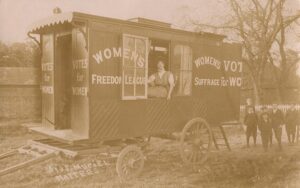
Dare to be free. Slogan of the Women’s Freedom League The Women’s Freedom League (WFL) was a militant suffrage organisation, […]
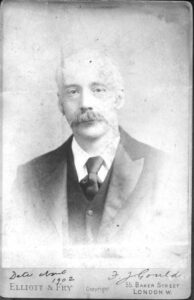
F.J. Gould was an influential educationist, writer, and humanist, whose tireless work towards secularising education helped to lay the groundwork […]
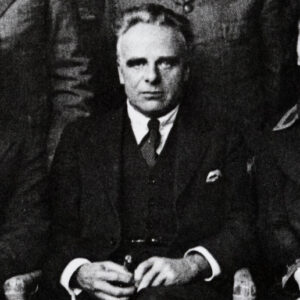
Our goal must be the good of the whole human society. Henry Noel Brailsford, Olives of Endless Age: being a […]